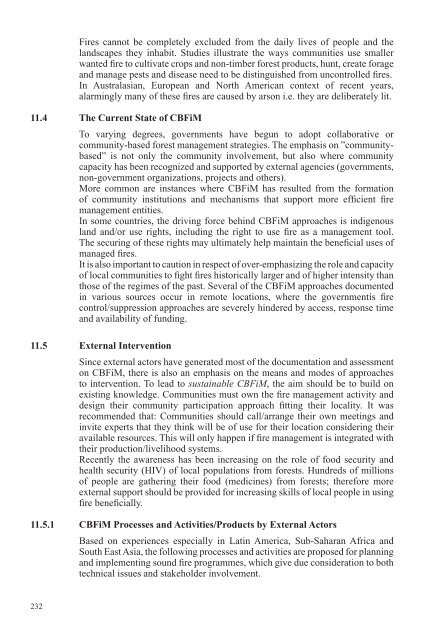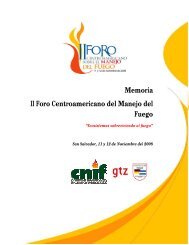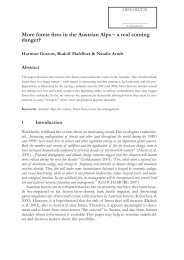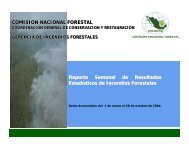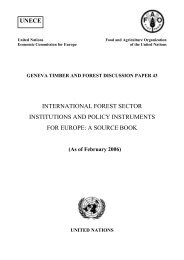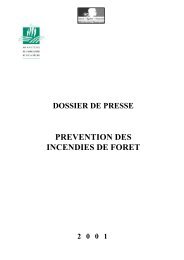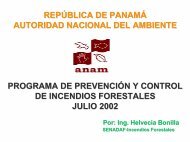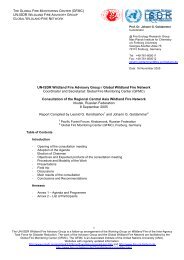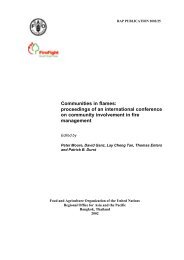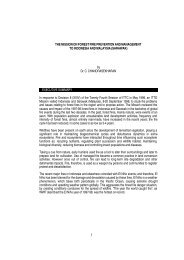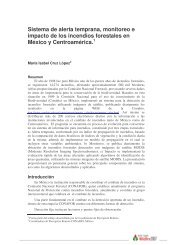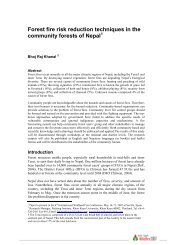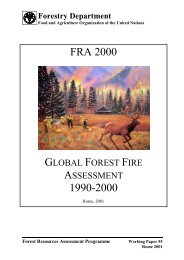Wildland Fire Management: Handbook for Trainers - The Global Fire ...
Wildland Fire Management: Handbook for Trainers - The Global Fire ...
Wildland Fire Management: Handbook for Trainers - The Global Fire ...
Create successful ePaper yourself
Turn your PDF publications into a flip-book with our unique Google optimized e-Paper software.
232<br />
<strong>Fire</strong>s cannot be completely excluded from the daily lives of people and the<br />
landscapes they inhabit. Studies illustrate the ways communities use smaller<br />
wanted fi re to cultivate crops and non-timber <strong>for</strong>est products, hunt, create <strong>for</strong>age<br />
and manage pests and disease need to be distinguished from uncontrolled fi res.<br />
In Australasian, European and North American context of recent years,<br />
alarmingly many of these fi res are caused by arson i.e. they are deliberately lit.<br />
11.4 <strong>The</strong> Current State of CBFiM<br />
To varying degrees, governments have begun to adopt collaborative or<br />
community-based <strong>for</strong>est management strategies. <strong>The</strong> emphasis on ”communitybased”<br />
is not only the community involvement, but also where community<br />
capacity has been recognized and supported by external agencies (governments,<br />
non-government organizations, projects and others).<br />
More common are instances where CBFiM has resulted from the <strong>for</strong>mation<br />
of community institutions and mechanisms that support more effi cient fi re<br />
management entities.<br />
In some countries, the driving <strong>for</strong>ce behind CBFiM approaches is indigenous<br />
land and/or use rights, including the right to use fi re as a management tool.<br />
<strong>The</strong> securing of these rights may ultimately help maintain the benefi cial uses of<br />
managed fi res.<br />
It is also important to caution in respect of over-emphasizing the role and capacity<br />
of local communities to fi ght fi res historically larger and of higher intensity than<br />
those of the regimes of the past. Several of the CBFiM approaches documented<br />
in various sources occur in remote locations, where the governmentís fi re<br />
control/suppression approaches are severely hindered by access, response time<br />
and availability of funding.<br />
11.5 External Intervention<br />
Since external actors have generated most of the documentation and assessment<br />
on CBFiM, there is also an emphasis on the means and modes of approaches<br />
to intervention. To lead to sustainable CBFiM, the aim should be to build on<br />
existing knowledge. Communities must own the fi re management activity and<br />
design their community participation approach fi tting their locality. It was<br />
recommended that: Communities should call/arrange their own meetings and<br />
invite experts that they think will be of use <strong>for</strong> their location considering their<br />
available resources. This will only happen if fi re management is integrated with<br />
their production/livelihood systems.<br />
Recently the awareness has been increasing on the role of food security and<br />
health security (HIV) of local populations from <strong>for</strong>ests. Hundreds of millions<br />
of people are gathering their food (medicines) from <strong>for</strong>ests; there<strong>for</strong>e more<br />
external support should be provided <strong>for</strong> increasing skills of local people in using<br />
fi re benefi cially.<br />
11.5.1 CBFiM Processes and Activities/Products by External Actors<br />
Based on experiences especially in Latin America, Sub-Saharan Africa and<br />
South East Asia, the following processes and activities are proposed <strong>for</strong> planning<br />
and implementing sound fi re programmes, which give due consideration to both<br />
technical issues and stakeholder involvement.


